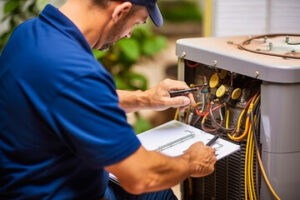Roofing can be an excellent career choice for skilled and efficient roofers. However, the career comes with its own set of risks.

When selecting a local roofing company, look for one that readily offers client references and images of completed projects. Also, ask about manufacturer accreditation. This is a sign of commitment to the craft and a good indicator of quality work. Contact Roofing Company Helena MT for professional help.
Roofing is dangerous, and the safety of everyone involved is a huge priority. A quality roofing contractor has the experience to know what to do in a variety of situations and will be able to quickly make a decision that protects their team and your property. They’re also aware of local building codes and regulations, which can help keep your project on track and prevent fines down the road.
The earning potential in the roofing industry is significant, and the sense of independence offered can be appealing to many. However, the physical endurance required and constant focus on safety can take a toll on anyone working in the field. This is why it’s important to find a company that truly understands the perks and challenges of this trade and can provide a quality customer experience from start to finish. They’ll back up their work with a warranty that provides peace of mind and an assurance they stand behind the quality of their services.
Licenses
A roofing license is a key credential that proves a contractor meets specific industry standards and knowledge. While most states require roofers to obtain licensing, the type of credentials required can vary by state and region. Some regions may only require a general contractor’s license, while others may mandate a roofing license or even a specialization. To qualify for a roofing license, contractors must pass an exam and meet minimum experience requirements. They may also need to submit references and proof of insurance coverage.
To verify a roofing contractor’s license, check online portals offered by state and local governments. These portals typically offer instant information on a contractor’s licensing status, including expiration dates and details on any disciplinary action. Additionally, many of these websites offer detailed information on the contractor’s insurance coverage and bonding status, which is essential for homeowners to know before hiring a roofing company.
State regulations often dictate that a licensed roofing contractor must carry liability insurance and workers’ compensation to protect homeowners from financial damages due to poor workmanship or safety hazards. The amount of coverage required varies by state, but a basic policy is usually enough. Likewise, most states require a roofing contractor to secure a surety bond that protects the client from any unpaid claims resulting from poor work or disciplinary actions by the state.
The amount of the bond is set by the surety company based on the applicant’s credit score, which is the best indicator of their ability to pay claims made against them. The premium rate is typically a small percentage of the bond’s penal sum.
Whether you are a new roofing contractor or an established business owner looking to expand your services, becoming licensed can open up a world of opportunities for you. Licensing can help you compete for larger projects, attract more clients, and enable you to provide specialized services such as solar or green roofing. To make your licensing process easier, use tools like Invoice Fly’s time tracking software to keep track of your work hours and ensure you meet all of your state’s experience requirements.
Manufacturer Accreditation
Manufacturer certification isn’t a marketing gimmick or an agreement to use a particular brand exclusively: it’s a stamp of approval. A roofing manufacturer will only certify contractors who have gone through their specific training program and upheld a solid record of quality installs, good customer service, and professionalism.
Manufacturer training programs vary by manufacturer, but most require a significant investment of both time and money. Typically, the training involves both a classroom setting with instructors and hands-on experience with the product in question. Some manufacturers also consider factors such as business history, creditworthiness, and asset-to-debt ratio as part of their certification process.
The advantages of working with a manufacturer-certified contractor are numerous and significant. Most significantly, they’re often authorized to offer exclusive limited warranties that can provide customers with extensive protection.
Another advantage of working with a manufacturer-certified contractor is their access to higher quality roofing materials. Because they represent the manufacturer’s brand, they can get shingles, vents, underlayment, and other roof materials directly from the factory. These premium products can lead to a better finished product and more peace of mind for homeowners.
Additionally, manufacturer-certified contractors are able to offer extended warranties. These additional warranties can cover both the roofing system and workmanship. Again, this is another great way to add extra security and confidence that your new roof will last for decades to come.
Finally, the best benefit of working with a manufacturer-certified contractor may be their dedication to superior craftsmanship and professionalism. The training and commitment required to become a certified installer typically indicates a true love for the craft and a strong desire to deliver top-quality workmanship. In addition, many manufacturer-certified contractors are held to high standards of conduct and customer service and are expected to maintain them at all times.
Local Online Reviews
Online reviews are a major factor in the decision-making process for prospective customers. They build trust, credibility, and influence the number and quality of leads your roofing business generates. Therefore, it is important that your roofing company is regularly monitoring and encouraging customer reviews on local platforms.
You can also use local directories to promote your services. They offer the opportunity to reach a wider audience and help you rank higher in search engine results pages (SERPs). Additionally, you can include a map of your service area on your website to enhance local SEO and improve visibility.
If a roofing contractor has been rated A+ with the Better Business Bureau, you can rest assured that they have the experience and reputation to provide high-quality work and professional customer service. In addition, a good roofing contractor will be able to assist you with navigating insurance claims after storm damage.
Reputable roofing companies will be proud to showcase references from past clients or examples of their work. Checking out these examples in person is a great way to gauge the craftsmanship, professionalism, and level of satisfaction. Look for reviews that mention the durability of the roof, the quality of the workmanship, and how the roofing company cleaned up after the project was completed.
In this day and age, most consumers research products and services before making a purchase. This is particularly true for significant purchases like a new roof. Many people will read online reviews and ask friends and family for recommendations before hiring a contractor. A reputable roofing company will be happy to share these positive reviews with you.
The internet has become the authority on a lot of things. Consumers turn to it for the simplest questions, and they expect the same kind of information when researching contractors. This is why it’s so important that your roofing company has a solid online presence, with well-optimized local SEO and local listings.
You should also invest time in creating content that resonates with your local audience, like blog posts on common roofing issues or case studies of successful roofing projects in your area. It is also critical to optimize your website content for local search by including relevant keywords in the content and metadata.




